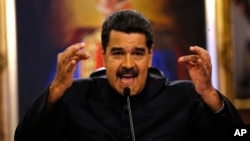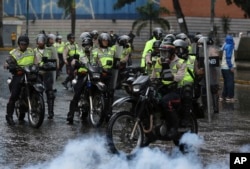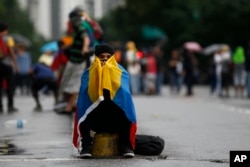Venezuela’s high court justices declared themselves under “terrorist” threat Wednesday, a day after an allegedly stolen police helicopter dropped several grenades on the Supreme Court building and fired shots at Interior Ministry offices.
"We declare that the Supreme Court, the magistrates, and other judges of the country are under the threat of terrorism,” said the court’s president, Maikel Moreno, according to the Associated Press. “Because of that we will ask to take measures to guarantee the safety and integrity of the institutions and its workers."
Authorities were searching Wednesday for the pilot, identified as Oscar Perez, 36, who commandeered the helicopter and flew a banner saying “Freedom!” Perez had a starring role in the action film “Death Suspended," playing a government agent who rescues a kidnapped businessman.
No one was injured in what President Nicolas Maduro also described as a “thwarted terrorist attack.” It occurred while the socialist leader was giving a news conference carried live on TV. “I have activated the entire armed forces to defend the peace,” he said.
But Maduro’s opponents questioned the terrorism designation, suggesting the attack was staged to give him license to use force against his critics and to proceed with a July 30 constitutional assembly to revise that fundamental document.
‘A cheap show’
“I’m not at all convinced by the helicopter incident,” Miguel Rodriguez, a former interior minister and intelligence chief, told Reuters Wednesday.
Rodriguez, who had worked for Maduro and his predecessor, Hugo Chavez, recently broke with the government. He questioned how the helicopter could fly near government institutions without challenge by Venezuelan security forces.
“Conclusion: a cheap show,” Rodriguez continued. “Who gains from this? Only Nicolas, for two reasons: to give credibility to his coup d'etat talk, and to blame Rodriguez," he said of himself.
On Tuesday, armed civilians and National Guard troops roughed up several opposition lawmakers as they tried to enter the Legislative Palace. One shoved National Assembly President Julio Borges as he and others tried to enter the building.
On Wednesday, some of those lawmakers registered an official complaint at the office of Venezuela’s attorney general, Luisa Ortega Diaz, a Chavez protégé who also has broken ranks with Maduro.
"We cannot permit … an official with a uniform to come and run over, beat us, mistreat us,” said Denis Fernandez, one of the lawmakers hit in Tuesday’s fracas. She told VOA that she and others were filing the complaint to show “we are not going to scale back our struggle … to defend the constitution."
Delsa de Solórzano, another lawmaker, said her spinal column “was deformed” by attackers’ blows. She said she would ignore orders for medical rest because “this country is not for rest.”
Demonstrations continue
On Wednesday, anti-government demonstrators in Caracas blocked streets with furniture, tree limbs, plants, rocks and broken glass as part of a nationwide protest scheduled from noon to 4 p.m. Protests have continued almost daily for three months, with clashes between Maduro’s foes and his supporters and security forces claiming at least 76 lives.
The latest victim: a 25-year-old man who was killed near a protest in Caracas’ Petare slum, Reuters reported Venezuelan authorities as saying Wednesday.
Maduro repeatedly has accused the United States of instigating the unrest in his country.
In Washington, Nikki Haley, the U.S. ambassador to the United Nations, urged continued pressure on Maduro to prevent further bloodshed.
“There are signs that now he will start using his military power and weapons,” Haley said in addressing the House Foreign Affairs Committee on Tuesday morning. “ … It's a terrible situation, so we have to put as much pressure on Maduro as we can."
At last week’s annual meeting of the Organization of American States’ General Assembly, U.S. officials urged passage of a measure to set up a committee to work with Venezuelans in restoring democratic norms. The measure failed to win sufficient support from the OAS’ 34 member nations.
In pressing the Maduro administration to hold long delayed democratic elections, the U.S. Treasury Department in May froze the assets of eight Venezuelan Supreme Court justices for trying to strip power from their country’s legislative branch two months earlier. In February, the Treasury froze the assets of Venezuelan Vice President Tareck El Aissami and a business associate for involvement in international drug trafficking.






